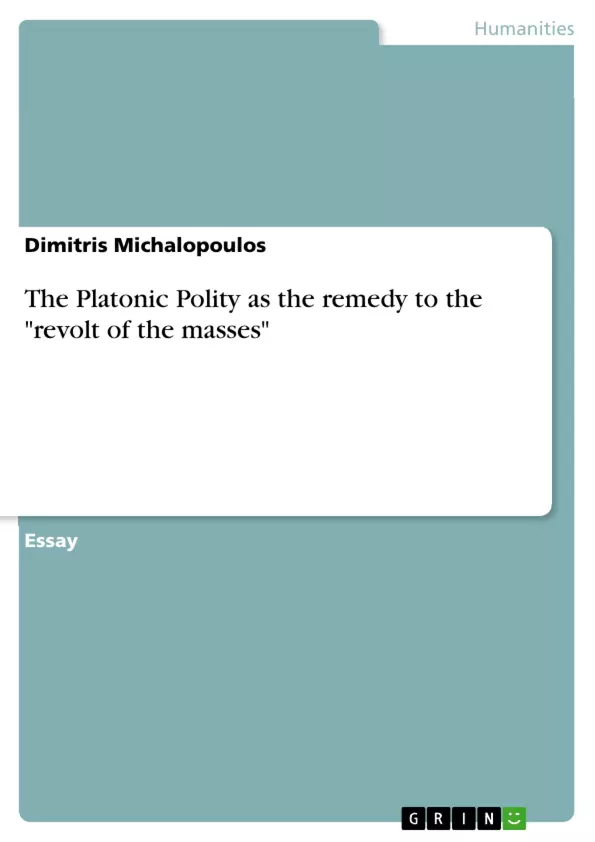The "Revolt of the Masses" commenced long before the twentieth century. And the only remedy to the ochlocratic/plutocratic democracy of our days is the implementation of the Platonic Polity. For unless "wisdom joins the political power", as the great Athenian philosopher has explained, the suffering of the humankind will never end.
Today, Plato’s political philosophy is more relevant than ever. Our world is ruled by a more or less “occult government” marked by “nepotistic plutocracy” and the consequent flagrant corruption. And this government exercises power thanks to support provided to them by all sorts of real or imaginary oppressed. And their method is simple, very simple. There is a huge difference between the common man and the man who is able to think. Yet, in the framework of today’s plutocratic democracy everyone, regardless of his origin, education and skills, is regarded as a human “truly having his mind at work” and accordingly entitled to have opinion on political matters. Usually, moreover, this very regime is labelled as “platonic”, but it is not. As a matter of fact, it is a perversion of Platonism. For it recognizes the problems that plague humankind today (overpopulation, environmental pollution, etc), but tries to solve them in a wrong way. According to Plato, nepotism and plutocracy bring about the destruction of the State.
Inhaltsverzeichnis (Table of Contents)
- CHAPTER 1 Three Impostors?
- CHAPTER 2 Plato's Polity as the Ideal State
- CHAPTER 3 The Platonic Legacy
Zielsetzung und Themenschwerpunkte (Objectives and Key Themes)
This work aims to explore the concept of the "Revolt of the Masses" as coined by José Ortega y Gasset, tracing its roots back to ancient times and examining its impact on various historical and political contexts. It analyzes Plato's political philosophy as a potential remedy for this phenomenon, emphasizing the importance of a rigid educational system and the need for wisdom in governance.
- The "Revolt of the Masses" and its historical manifestations
- Plato's philosophy as a response to social unrest and political instability
- The role of education and social ranking in shaping a just society
- The dangers of nepotism, plutocracy, and mob rule
- The relevance of Plato's ideas to contemporary political and social challenges
Zusammenfassung der Kapitel (Chapter Summaries)
- Chapter 1: Three Impostors? This chapter introduces the concept of the "Revolt of the Masses" and its historical roots, tracing its origins to the leadership of Moses, Jesus Christ, and Muhammad. It argues that these figures, while considered revolutionaries, were ultimately manipulated by the mob's desire for a "Messiah's coming" and a utopian afterlife.
- Chapter 2: Plato's Polity as the Ideal State This chapter examines Plato's political philosophy as a remedy for the "Revolt of the Masses." It highlights the Athenian philosopher's belief that wisdom is essential for effective governance and advocates for a strict educational system that selects only the most qualified individuals to rule. Plato's solution involves the abolishment of the family and the establishment of communal ownership of goods, while simultaneously emphasizing the importance of social ranking based on merit.
Schlüsselwörter (Keywords)
The main keywords and focus topics of this work include the "Revolt of the Masses," Plato's political philosophy, social justice, education, governance, nepotism, plutocracy, and mob rule. It examines the historical roots of the "Revolt of the Masses" and proposes Plato's ideas as a potential remedy for contemporary political and social challenges. Key themes include the importance of wisdom in leadership, the need for a meritocratic society, and the dangers of populism and demagoguery.
Frequently Asked Questions
What is the "Revolt of the Masses" according to this work?
The concept, coined by José Ortega y Gasset, refers to the rise of mass society where the common man feels entitled to have opinions on complex political matters without having the necessary education or wisdom.
How does Plato's political philosophy serve as a remedy for social unrest?
Plato advocates for a "Platonic Polity" where political power is joined with wisdom. He suggests a meritocratic system where only those with the highest education and philosophical insight should rule.
What are the dangers of plutocracy and nepotism in governance?
According to Plato, nepotism and plutocracy (rule by the wealthy) lead to flagrant corruption and the eventual destruction of the State because they prioritize private interests over the common good.
Why did Plato propose the abolishment of the family for the ruling class?
To prevent nepotism and ensure that rulers remain focused solely on the welfare of the State, Plato suggested communal living and ownership for the guardians, removing personal family ties.
Is modern democracy viewed as "Platonic" in this analysis?
No, the work argues that today's ochlocratic (mob rule) or plutocratic democracies are often a perversion of Platonism, failing to solve systemic problems like overpopulation or pollution correctly.
What is the role of education in Plato's Ideal State?
Education is the cornerstone of the Platonic State; it serves as a strict selection process to identify individuals based on merit and wisdom to fulfill their specific roles in society.
- Quote paper
- Dimitris Michalopoulos (Author), 2023, The Platonic Polity as the remedy to the "revolt of the masses", Munich, GRIN Verlag, https://www.hausarbeiten.de/document/1403070


